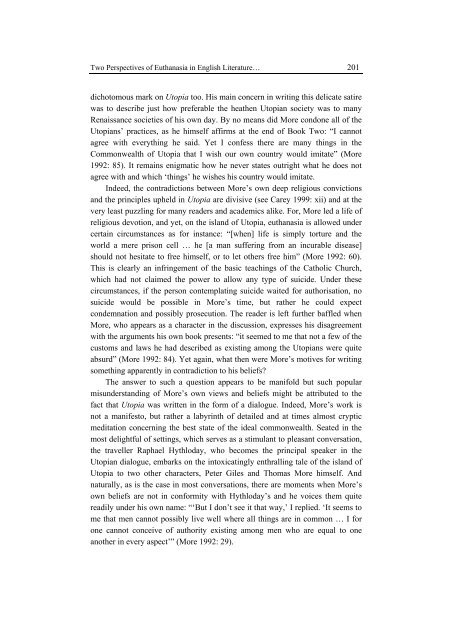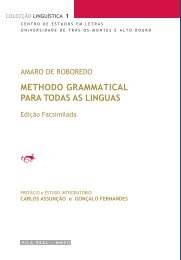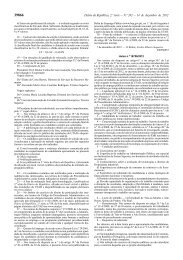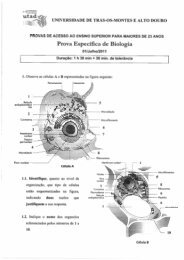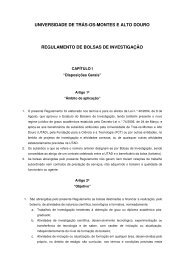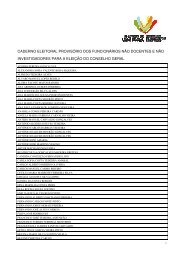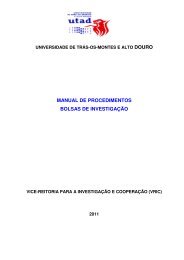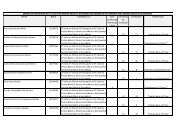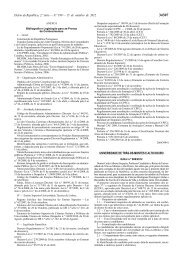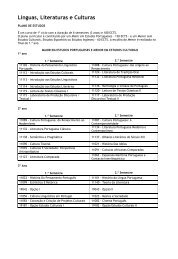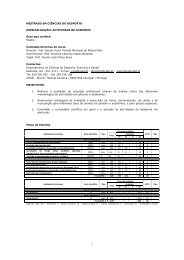- Page 1 and 2:
Dezembro de 2007 Revista de Letras
- Page 3 and 4:
REVISTA DE LETRAS Direcção Carlos
- Page 5 and 6:
LITERATURA Two Perspectives of Euth
- Page 7 and 8:
6 Nota Introdutória Quanto às tem
- Page 10 and 11:
Para além-mar e para além da orto
- Page 12 and 13:
Para além-mar e para além da orto
- Page 14 and 15:
Para além-mar e para além da orto
- Page 16 and 17:
Para além-mar e para além da orto
- Page 18 and 19:
Point of view in Pérez-Reverte’s
- Page 20 and 21:
Point of view in Pérez-Reverte’s
- Page 22 and 23:
Point of view in Pérez-Reverte’s
- Page 24 and 25:
Point of view in Pérez-Reverte’s
- Page 26 and 27:
Point of view in Pérez-Reverte’s
- Page 28 and 29:
Point of view in Pérez-Reverte’s
- Page 30 and 31:
Le jugement de valeur - 2 - André
- Page 32 and 33:
Le Jugement de Valeur 31 Vilela, on
- Page 34 and 35:
Le Jugement de Valeur 33 «Bien que
- Page 36:
Le Jugement de Valeur 35 En revanch
- Page 39 and 40:
38 Maria Filomena Gonçalves intens
- Page 41 and 42:
40 Maria Filomena Gonçalves latina
- Page 43 and 44:
42 Maria Filomena Gonçalves public
- Page 45 and 46:
44 Maria Filomena Gonçalves conhec
- Page 47 and 48:
46 Maria Filomena Gonçalves 5. Uma
- Page 49 and 50:
48 Maria Filomena Gonçalves Torres
- Page 51 and 52:
50 Maria Filomena Gonçalves Anexo
- Page 54 and 55:
Património, Língua e Cultura: con
- Page 56 and 57:
Património, Língua e Cultura: Con
- Page 58 and 59:
Património, Língua e Cultura: Con
- Page 60 and 61:
Património, Língua e Cultura: Con
- Page 62 and 63:
Património, Língua e Cultura: Con
- Page 64 and 65:
Património, Língua e Cultura: Con
- Page 66 and 67:
Património, Língua e Cultura: Con
- Page 68 and 69:
Património, Língua e Cultura: Con
- Page 70 and 71:
Património, Língua e Cultura: Con
- Page 72:
Património, Língua e Cultura: Con
- Page 75 and 76:
74 Rui Dias Guimarães 1. Introduç
- Page 77 and 78:
76 Rui Dias Guimarães A norma, de
- Page 79 and 80:
78 Rui Dias Guimarães É, sem dúv
- Page 81 and 82:
80 Rui Dias Guimarães A notável i
- Page 83 and 84:
82 Rui Dias Guimarães Cunha, C. E
- Page 85 and 86:
84 Marlene Vasques Loureiro On peut
- Page 87 and 88:
86 Marlene Vasques Loureiro Portant
- Page 89 and 90:
88 Marlene Vasques Loureiro d’en
- Page 91 and 92:
90 Marlene Vasques Loureiro Si ce m
- Page 93 and 94:
92 Marlene Vasques Loureiro afirman
- Page 95 and 96:
94 Marlene Vasques Loureiro Broncka
- Page 98 and 99:
Signo e significação no primeiro
- Page 100 and 101:
Signo e significação no primeiro
- Page 102 and 103:
Signo e significação no primeiro
- Page 104 and 105:
Signo e significação no primeiro
- Page 106 and 107:
Signo e significação no primeiro
- Page 108:
Signo e significação no primeiro
- Page 111 and 112:
110 László Magocsa both the learn
- Page 113 and 114:
112 László Magocsa needs a very c
- Page 115 and 116:
114 László Magocsa able to really
- Page 117 and 118:
116 Hiroyuki Mito Na história japo
- Page 119 and 120:
118 Hiroyuki Mito “Tonghae”, es
- Page 121 and 122:
120 Hiroyuki Mito A forma Gipou vir
- Page 123 and 124:
122 Hiroyuki Mito NIPHON. A mayor I
- Page 125 and 126:
124 Hiroyuki Mito q´ então tinha
- Page 127 and 128:
126 Hiroyuki Mito Seguem-se as desc
- Page 129 and 130:
128 Hiroyuki Mito praticamente desa
- Page 131 and 132:
130 Irene López Rodríguez As the
- Page 133 and 134:
132 Irene López Rodríguez Girl, i
- Page 135 and 136:
134 Irene López Rodríguez In the
- Page 137 and 138:
136 Irene López Rodríguez As can
- Page 139 and 140:
138 Irene López Rodríguez IV. - A
- Page 141 and 142:
140 Irene López Rodríguez OBJECT
- Page 143 and 144:
142 Irene López Rodríguez of the
- Page 145 and 146:
144 Irene López Rodríguez (28) In
- Page 147 and 148:
146 Irene López Rodríguez contemp
- Page 149 and 150:
148 Irene López Rodríguez follow
- Page 151 and 152: 150 Irene López Rodríguez Echevar
- Page 153 and 154: 152 Irene López Rodríguez Nesi, H
- Page 156 and 157: Tombo e Demarcação do concelho de
- Page 158 and 159: Tombo e Demarcação do concelho de
- Page 160 and 161: Tombo e Demarcação do concelho de
- Page 162 and 163: Tombo e Demarcação do concelho de
- Page 164 and 165: Tombo e Demarcação do concelho de
- Page 166 and 167: Tombo e Demarcação do concelho de
- Page 168 and 169: Tombo e Demarcação do concelho de
- Page 170 and 171: Tombo e Demarcação do concelho de
- Page 172 and 173: Tombo e Demarcação do concelho de
- Page 174: Tombo e Demarcação do concelho de
- Page 177 and 178: 176 Xosé Manuel Sánchez Rei arca
- Page 179 and 180: 178 Xosé Manuel Sánchez Rei ácha
- Page 181 and 182: 180 Xosé Manuel Sánchez Rei singu
- Page 183 and 184: 182 Xosé Manuel Sánchez Rei nos l
- Page 185 and 186: 184 Xosé Manuel Sánchez Rei o da
- Page 187 and 188: 186 Xosé Manuel Sánchez Rei Tabel
- Page 189 and 190: 188 Xosé Manuel Sánchez Rei Frecu
- Page 191 and 192: 190 Xosé Manuel Sánchez Rei demon
- Page 193 and 194: 192 Xosé Manuel Sánchez Rei Diess
- Page 195 and 196: 194 Xosé Manuel Sánchez Rei Macha
- Page 198 and 199: Two Perspectives of Euthanasia in E
- Page 200 and 201: Two Perspectives of Euthanasia in E
- Page 204 and 205: Two Perspectives of Euthanasia in E
- Page 206 and 207: Two Perspectives of Euthanasia in E
- Page 208 and 209: Two Perspectives of Euthanasia in E
- Page 210 and 211: Two Perspectives of Euthanasia in E
- Page 212 and 213: Two Perspectives of Euthanasia in E
- Page 214 and 215: Two Perspectives of Euthanasia in E
- Page 216 and 217: Para além do “Sermão de St.º A
- Page 218 and 219: Para além do “Sermão de St.º A
- Page 220 and 221: Para além do “Sermão de St.º A
- Page 222 and 223: Para além do “Sermão de St.º A
- Page 224 and 225: Formulação histórico-crítica de
- Page 226 and 227: Formulação histórico-crítica de
- Page 228 and 229: Formulação histórico-crítica de
- Page 230 and 231: Formulação histórico-crítica de
- Page 232 and 233: Especificidades da criação liter
- Page 234 and 235: Especificidades da criação liter
- Page 236: Especificidades da criação liter
- Page 239 and 240: 238 M.ª da Assunção Anes Morais
- Page 241 and 242: 240 M.ª da Assunção Anes Morais
- Page 243 and 244: 242 M.ª da Assunção Anes Morais
- Page 245 and 246: 244 M.ª da Assunção Anes Morais
- Page 247 and 248: 246 M.ª da Assunção Anes Morais
- Page 249 and 250: 248 Karen C. Sherwood Sotelino orie
- Page 251 and 252: 250 Karen C. Sherwood Sotelino Gome
- Page 253 and 254:
252 Karen C. Sherwood Sotelino Juxt
- Page 255 and 256:
254 Karen C. Sherwood Sotelino ser
- Page 258:
CULTURA
- Page 261 and 262:
260 António Bárbolo Alves Marquez
- Page 263 and 264:
262 António Bárbolo Alves Numa Pa
- Page 265 and 266:
264 António Bárbolo Alves igualme
- Page 267 and 268:
266 António Bárbolo Alves O teatr
- Page 269 and 270:
268 António Bárbolo Alves A tradi
- Page 271 and 272:
270 António Bárbolo Alves Centro
- Page 273 and 274:
272 António Bárbolo Alves mirande
- Page 275 and 276:
274 António Bárbolo Alves Natural
- Page 278 and 279:
Interculturalidade e tradução Ann
- Page 280 and 281:
Interculturalidade e tradução 279
- Page 282 and 283:
Interculturalidade e tradução 281
- Page 284 and 285:
Interculturalidade e tradução 283
- Page 286 and 287:
A investigação da escrita no Arch
- Page 288 and 289:
A investigação da escrita no Arch
- Page 290 and 291:
A investigação da escrita no Arch
- Page 292 and 293:
A investigação da escrita no Arch
- Page 294 and 295:
A investigação da escrita no Arch
- Page 296 and 297:
A investigação da escrita no Arch
- Page 298 and 299:
Racial Complexities in the Work of
- Page 300 and 301:
Racial complexities in the work of
- Page 302 and 303:
Racial complexities in the work of
- Page 304 and 305:
Racial complexities in the work of
- Page 306 and 307:
Da memória ao acesso à Informaç
- Page 308 and 309:
Da memória ao acesso à Informaç
- Page 310 and 311:
Da memória ao acesso à Informaç
- Page 312 and 313:
Da memória ao acesso à Informaç
- Page 314 and 315:
Da memória ao acesso à Informaç
- Page 316 and 317:
Da memória ao acesso à Informaç
- Page 318:
Da memória ao acesso à Informaç
- Page 321 and 322:
320 Francisco Ribeiro da Silva Por
- Page 323 and 324:
322 Francisco Ribeiro da Silva trat
- Page 325 and 326:
324 Francisco Ribeiro da Silva vamp
- Page 327 and 328:
326 Francisco Ribeiro da Silva even
- Page 329 and 330:
328 Francisco Ribeiro da Silva merc
- Page 331 and 332:
330 Francisco Ribeiro da Silva mesm
- Page 333 and 334:
332 Francisco Ribeiro da Silva frut
- Page 335 and 336:
334 Francisco Ribeiro da Silva demo
- Page 337 and 338:
336 Francisco Ribeiro da Silva «in
- Page 339 and 340:
338 Francisco Ribeiro da Silva nota
- Page 341 and 342:
340 Francisco Ribeiro da Silva faze
- Page 343 and 344:
342 Francisco Ribeiro da Silva dive
- Page 346 and 347:
Comunicação e Cultura Fernando Al
- Page 348 and 349:
Comunicação e Cultura 347 Apresen
- Page 350 and 351:
Comunicação e Cultura 349 que se
- Page 352:
VARIA
- Page 355 and 356:
354 Recensões desentendimento. As
- Page 357 and 358:
356 Recensões alia-se à flexibili
- Page 359 and 360:
358 Recensões José Manuel da Cost
- Page 361 and 362:
360 Recensões epistolar entre as d
- Page 363 and 364:
362 Recensões Esteves, a alavanca
- Page 365 and 366:
364 Teses de Doutoramento e Dissert
- Page 367 and 368:
366 Teses de Doutoramento e Dissert


